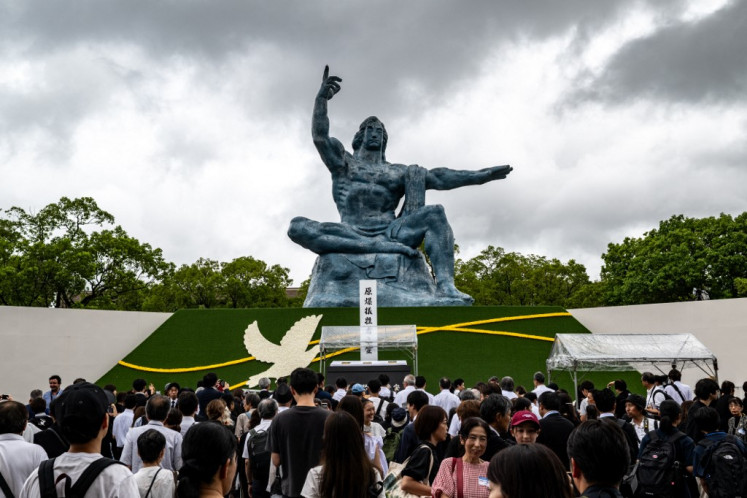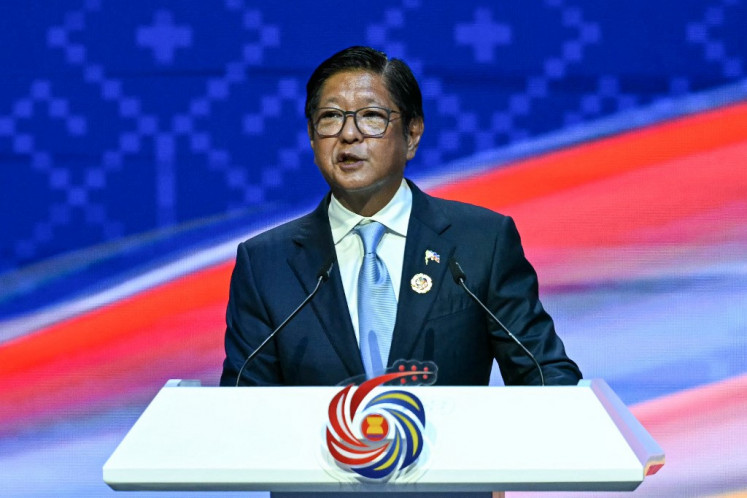Popular Reads
Top Results
Can't find what you're looking for?
View all search resultsPopular Reads
Top Results
Can't find what you're looking for?
View all search resultsGoverning AI, preserving democracy
For Indonesia, regulating AI transcends concerns about innovation or data protection, it is fundamentally about upholding the constitution and defending human rights.
Change text size
Gift Premium Articles
to Anyone
W
hat if public opinion was one day shaped by algorithms no one can audit? What if the truth itself became obscured by machine-generated content that merely looks convincing?
Artificial intelligence has transcended its technical origins to become a force reshaping behavior, perception and the very foundations of public discourse.
As Indonesia races toward its third-quarter 2025 deadline to finalize comprehensive AI regulations, joining many nations already implementing such frameworks, the pressing question remains: are we truly ready?
Contrary to popular belief, AI systems do not materialize from some algorithmic ether. They are developed by corporate interests, trained on available datasets and deployed to maximize engagement and profit rather than serve the public good.
These systems inevitably inherit and amplify the biases embedded in their training data, creating what researchers call “automation bias”, the dangerous tendency to trust machine outputs over human judgment.
For Indonesia, a democracy of over 280 million citizens increasingly dependent on digital platforms for information, regulating AI transcends concerns about innovation or data protection. It is fundamentally about upholding the constitution and defending human rights.
Communication and Digital Affairs Deputy Minister Nezar Patria has announced that Indonesia’s AI regulation will draw from global standards, including the EU AI Act, OECD Principles on AI and UNESCO’s Recommendation on the Ethics of AI. He is also committed to inclusive policymaking and active participation in ASEAN dialogues for regionally responsible AI governance.
These efforts deserve recognition. The referenced frameworks emphasize risk-based approaches, algorithmic transparency, data protection and alignment with constitutional values.
The government’s intention to codify AI policy through a Presidential Regulation (Perpres), with the national AI Roadmap serving as a strategic guide – reflects serious institutional commitment. Yet Indonesia’s regulatory landscape reveals a troubling pattern: ambitious frameworks that lack enforcement teeth.
Carnegie Council’s Anja Kaspersen warns that fragmented norms and implementation gaps create major risks when regulation remains overly soft or narrowly ethics-focused. Similarly, technology critic Evgeny Morozov cautions against “technological solutionism”, the seductive belief that complex social problems can be resolved through technology rather than structural reform. That assumption becomes perilous when AI regulation emphasizes efficiency while overlooking structural issues such as data monopolies, limited civic participation and unchallenged market dominance.
Generative AI poses real threats to journalism’s sustainability. Models like ChatGPT and Gemini systematically ingest news content without consent, compensation or attribution, a practice that undermines both intellectual property and the economic foundations of independent media.
The economic implications extend beyond copyright infringement. Platform algorithms increasingly privilege engagement over accuracy, promoting sensationalized content while marginalizing rigorous fact-based reporting. This algorithmic favoritism creates a perverse incentive structure where verified journalism becomes economically unsustainable.
The European Union has addressed these risks through its AI Act and Copyright in the Digital Single Market (CDSM) Directive, requiring transparency in manipulative content systems while reinforcing publisher’s economic rights. Australia and Canada have prompted public calls to expand similar frameworks, acknowledging that unchecked AI development could hollow out the information ecosystem that democratic societies require.
Indonesia, on the other hand, lags behind. No regulation explicitly protects journalistic content from AI exploitation, leaving media companies caught in a pincer between declining ad revenues and growing risks of content appropriation without legal protection or fair compensation.
If current trends continue, journalism risks losing both economic foundation and political significance. Content produced through labor, cost and editorial integrity becomes easily appropriated by automated systems bearing no public responsibility. Ethical appeals alone will not suffice; the state must intervene with enforceable regulations guaranteeing information justice and journalism's survival.
Indonesia’s constitution enshrines the right to information (Article 28F), the right to privacy (Article 28G) and equality before the law (Article 28D). Regulating AI and publisher rights is not merely reactive to global trends, it is a constitutional obligation.
AI is just as much about who controls knowledge and shapes public opinion as it is about innovation. Without political courage to defend journalism from digital exploitation, our public sphere will be governed by algorithms aligned more with clicks and capital than truth.
Indonesia must design a technology policy that is both adaptive and anchored in constitutional values and social justice. In journalism and media, this means ensuring algorithmic transparency, labelling machine-generated content and protecting public rights to control personal data and digital identities.
A truly independent AI oversight authority must possess both technical expertise and democratic legitimacy, be empowered to audit algorithms, conduct social impact assessments and facilitate meaningful public participation in technology governance. Without such concrete steps, Indonesia risks digital colonization by foreign tech giants operating beyond domestic accountability.
OpenAI CEO Sam Altman once warned that AI could become either humanity’s most empowering or most dangerous technology. Often forgotten is that AI is not neutral. It is shaped by biased data, opaque algorithms and economic motives controlled by a handful of global corporations.
As Morozov argues, technology always carries ideology. Without visionary leadership and political resolve, AI will not merely reshape how we work and think, it will rewrite the social contract without public consent.
When algorithmic decision-making replaces democratic deliberation, technology ceases to be a servant and becomes power itself.
---
The writer is a digital law researcher at Universitas Padjajaran. The views expressed are personal.











